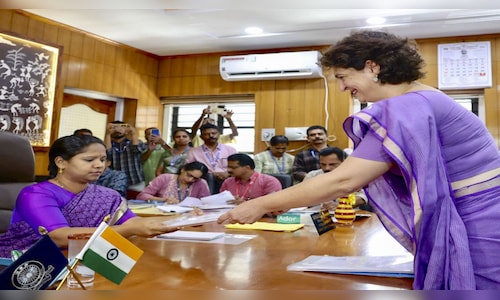[ad_1]
On November 13, voters in Assam, Bihar, Chhattisgarh, Gujarat, Karnataka, Madhya Pradesh, Meghalaya, Rajasthan, Sikkim, and West Bengal would decide who should be chosen while those in Kerala, Punjab, and Uttar Pradesh asked to pick a representative on November 20
The voters in Kerala’s Wayanad Lok Sabha constituency would determine who should be their representative from the seat vacated by Rahul Gandhi, the Leader of the Opposition in the Lok Sabha, on November 13. Priyanka Gandhi Vadra is making her electoral debut in this constituency, making it a high-profile contest.
On November 20 in addition to voting for the state assembly, Maharashtra would vote in the Nanded Parliamentary constituency to fill a vacancy created by the death of Vasantrao Balwantrao Chavan of the Indian National Congress. Along with residents of Kerala, Punjab, and UP, residents of Uttarakhand would vote in the Kedarnath assembly constituency, following the death of Shaila Rani Rawat of the BJP.
While polls in each state hold significance, yet in terms of the number of vacancies, those of Uttar Pradesh, (nine seats), Rajasthan (seven), West Bengal (six), Assam (five), Punjab, and Bihar (four each) would be under the spotlight. The incumbent state governments would be keen to win the maximum to underscore their political grip.
In UP, the Yogi government faces a litmus test since the BJP suffered a major setback in the general elections. The Chief Minister took the flak for the results that led to the Modi Government failing to cross a simple majority mark in the Lok Sabha. Barring one assembly constituency (Sisamau) the rest went vacant after the legislators resigned on being elected to the Lok Sabha. The electoral contest would be a contest essentially between the BJP and the Samajwadi Party, whose electoral fortunes are on the rise.
The Congress party, which leads the I.N.D.I. Alliance made a strategic decision to extend support to the SP instead of taking the two seats Khair and Ghaziabad it was offered. Soon after Congress lost the Haryana assembly elections, the SP Chief Akhilesh Yadav announced candidates on six of the nine seats. The party took an ideological stand of throwing its weight behind SP since the larger fight against the BJP remains undiminished.
Rajasthan, which was a happy hunting ground for the Congress in the Lok Sabha elections, should see the incumbent Chief Minister Bhajan Lal Sharma attempt to win the most for the Bharatiya Janata Party. The issue is also one of prestige since the Chief Minister could not replicate the success rate in the general elections some five months after wresting office from the Congress in the state.
In West Bengal, Chief Minister Mamata Banerjee and her Trinamool Congress would be on a test since this would be the first opportunity for the people to speak up after the Doctors’ strike and protest. The state witnessed political turmoil following the case of rape and brutal murder of a young doctor. Though peace has been restored, there is fragility and the wounds are still raw.
Chief Minister Hemanta Biswa Sarma, who is spearheading the campaign for the BJP in Jharkhand, would be tested on his home ground by the Congress just as in Bihar, Janata Dal (United) Chief Minister and his ally, the BJP are being challenged by the Rashtriya Janata Dal. In Bihar, these polls offer a reality check for political parties ahead of the state assembly polls due next year.
Finally, the ground conditions in Punjab have altered drastically following the decision of the Shiromani Akali Dal (Badal) not to contest these by-elections. The reasons are two-fold. The party, which in the past had its own Chief Minister in the towering leader Parkash Singh Badal, lost much ground. His son Sukhbir Badal, who served as his Deputy, just could not rekindle the Akali hold. Recently, the highest Sikh temporal seat held him guilty of religious misconduct. It turned down appeals to allow him to lead the party’s campaign in the by-elections. Now the turf is open for a direct contest between the Aam Aadmi Party, which is in government, and the Congress party.
—The author, K V Prasad, is an author and political analyst. The views expressed are personal.
Read his previous articles here
[ad_2]
Source link










